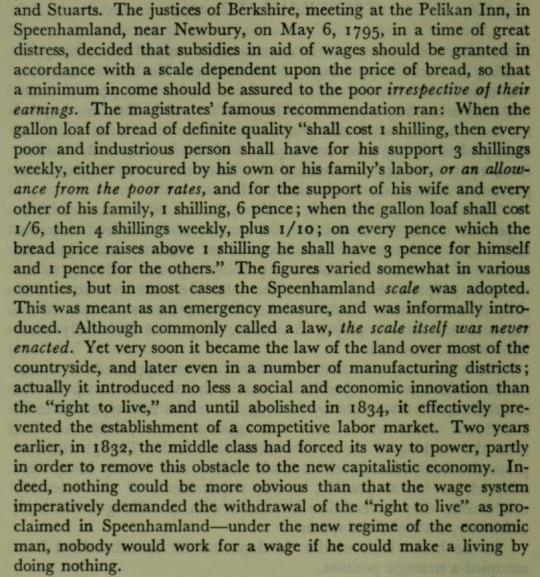#...basically tax and legal form reasons to tldr
Explore tagged Tumblr posts
Text
((BIG moment, but tomorrow we're going to formally place the movement to place baby sibling under MY name officially -- plus I'm changing my legal name and pronouns. wish me luck!! ))
#ooc: my patron speaks#i'm super nervous#...basically tax and legal form reasons to tldr#also i have the option to formally update pronouns and name in a separate filing -- so i'm gonna do it!!!#i'll have to update every official document i have now but... to have MY name it'll be worth it yeah ?
6 notes
·
View notes
Text

@anthonydeleon
As far as I understand it the Speehamland subsidies put people at just able to pay rent and most of the time to buy food. I have no idea what that would translate for you guys in the US (which I assume you're from by the $ and lack of any other currency indicators).
Even in the time period we're talking about in Britain above, quitting the workforce for UBI wasn't actually a thing, even though that's what the ownership class was worried about. What WAS a thing though was the wages for labor dropped through the floor.
One reason was, people were prevented by law from leaving the village where they were born, so they could only take what they could get in a certain area available to them legally.
Another reason was, people didn’t see this work as valuable, there was no future in it for them, and they were treated as disposable and interchangeable, and so the work ethic also fell through the floor, so people did as little as possible on their jobs.
Another reason was, there was already a cultural norm where jobless people were placed on farms and wherever they could, and the farmers/owners would be given a tax rebate for taking these workers. And then see above, because the workers didn’t see the work as valuable to them, there was no future in it for them, so the work was shitty.
So there was an enshittification of work standards and work ethic, to borrow a phrase.
Another reason was, even when people broke the law to go to work in factories in manufacturing areas, these were generally unskilled dead-end jobs (take the bobbin off the rack, take the bobbin off the rack, take the…) that didn’t lead to any kind of skilled career (unlike farming, which led to multiple skills and long-term prospects at the time), and so whenever oversupply or other market instabilities hit, they would be instantly laid off, and so go back to their home villages. Which meant that even as trade and the general economy was improving overall (in terms of number of dollars made, number of products made) in actual fact the number of unskilled unemployed workers was exploding, and so therefore also the number of unemployed people in their home parishes, supported by the parish stipend.
Also, the people who DID want to do a good job, and practice their trade honorably, or didn’t want to be ‘on the rates’ out of pride and sense of self, were completely priced out of the market, because they couldn’t support themselves on the shitty low wages (far below the subsistence-level stipend) given to labor.
Also the people who wanted to pay people a decent wage couldn’t, because the prices for their goods and services were completely undercut by the lower prices by the people selling things based on the artificially depressed wages for labor.
The upshot was that nobody was having a good time. The laborers were living within a hair’s breadth of starvation and misery, the factories and farmers were getting shitty labor and still were barely able to sell their goods even at their low prices (whole other can of beans) , and the ratepayers (tax payers of the time) were in fact basically subsidising the employers and farmers without substantially benefitting the workers. And also those self-same ratepayers were also facing spiralling tax rates because of the number of workers who were on the rates, which made them even less interested in incurring higher costs by paying workers more.
The interesting thing to me is that the thinkers of the day were against Speehamland because they thought they would RAISE wages and cause a vicious price spike in commodities, and I wish I knew what their logic was.
The other variable in this whole mess was that people were prevented by law from forming unions, so it's hard to know whether, if people had been able to collectively bargain, that would have changed the situation.
tldr: Speehamland subsidies were a huge mess of a vicious cycle of nobody getting what they needed, and only delayed the full marketization of labor, which still led to a century and a half of widespread misery for the working classes.
if you want more detail you can check out my Karl Polyani tag
wow so I was today years old when I learned that the concept of the UBI is as old as the concept of a labor market

and that also by effectively preventing the establishment of a labor market (i.e. the buying and selling of human being's labor time) for at least 40 years, it eased the suffering of workers in Britain during the transition to the market economy.
and the middle class opposed it for the same reason it's opposed now: that if people didn't have to work for a living, they wouldn't
and by 'work for a living' they meant 'staff our businesses'
'nobody wants to work' is a 300 year old whine
--The Great Transformation, Karl Polyani Ch.7 p.78
18 notes
·
View notes